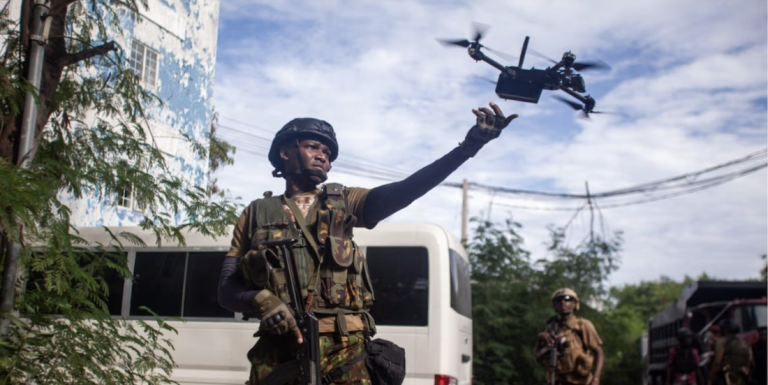
Video evidence shows aerial attacks helping government forces regain control of Port-au-Prince streets
New York, N.Y. – In a dramatic shift in Haiti’s ongoing battle against criminal gangs, police forces have turned to drone technology to reclaim control of the capital city’s streets.
Social media footage reveals coordinated aerial attacks that have helped government forces gain ground against heavily armed criminal organizations that have terrorized Port-au-Prince for months.
The drone warfare campaign represents a significant escalation in Haiti’s fight against gang violence, with eyewitnesses describing ground-shaking explosions as unmanned aircraft target gang strongholds throughout the capital. Video clips circulating on social media platforms show precision strikes hitting gang positions, marking a technological advancement in the Haitian National Police‘s capabilities.
Revolutionary Tactics Transform Urban Warfare
The deployment of drone technology has fundamentally altered the dynamics of Haiti’s security crisis. Criminal gangs, which previously controlled an estimated 60 percent of Port-au-Prince, now face an aerial threat they are ill-equipped to counter. The G9 alliance, a coalition of the most powerful gangs, has seen their territorial control challenged by this new tactical approach.
Local residents report a noticeable decrease in gang activity in neighborhoods where drone operations have been conducted. “The ground shook when the drones attacked,” said one Port-au-Prince resident who requested anonymity for safety reasons. “For the first time in months, we could walk to the market without fear.”
The Multinational Security Support Mission (MSS), led by Kenyan forces, has provided technical assistance and training to Haitian security forces. This international cooperation has been crucial in developing the drone program’s operational capabilities.
Gang Leaders Forced to Adapt Strategies
Criminal organizations have been compelled to modify their operational patterns in response to the aerial threat.

Intelligence sources indicate that gang leaders have moved operations underground and reduced their visibility in open areas.
The Jimmy “Barbecue” Chérizier faction, one of the most notorious groups, has reportedly relocated key personnel to avoid drone surveillance.
The psychological impact of drone warfare has proven equally significant. Gang members, accustomed to operating with impunity, now face constant surveillance and potential attack from above.
This shift has disrupted their ability to coordinate large-scale operations and maintain territorial control.
Security analysts note that the drone campaign has effectively neutralized some gang leaders who previously seemed untouchable. The precision of aerial strikes has eliminated key figures while minimizing civilian casualties, a significant improvement over previous ground-based operations.
International Support Strengthens Police Capabilities
The United Nations has provided logistical support for the drone program, while the United States has contributed technical expertise and intelligence-gathering capabilities. This international cooperation has been essential in developing Haiti’s indigenous security capacity.
Regional partners, including the Dominican Republic and Jamaica, have offered training facilities and operational support. The Caribbean Community (CARICOM) has endorsed the drone program as a legitimate response to the gang crisis threatening regional stability.
The European Union has provided financial backing for the initiative, recognizing that Haiti’s security crisis has implications beyond its borders.
Drug trafficking routes that pass through Haiti affect multiple
nations, making international cooperation a strategic necessity.
Challenges Remain Despite Early Success
While drone operations have shown promise, significant challenges persist.

Criminal gangs retain control of strategic infrastructure, including the main port and airport.
The Toussaint Louverture International Airport remains partially under gang influence, limiting international aid delivery.
Humanitarian organizations express concern about the potential for civilian casualties as drone operations expand.
The International Red Cross has called for strict adherence to international humanitarian law in conducting aerial operations.
Economic recovery remains elusive as businesses struggle to reopen in areas still affected by gang violence.
The Haitian Chamber of Commerce reports that many enterprises remain closed due to security concerns, despite improvements in some neighborhoods.
Future Prospects for Stability
The drone program’s success has generated optimism among government officials and international partners. Prime Minister Garry Conille has announced plans to expand the program to cover additional areas of the capital and eventually extend operations to other cities.
Training programs for Haitian police officers continue to develop local expertise in drone operations. The goal is to create a sustainable security capability that reduces dependence on international support while maintaining operational effectiveness.
The Haitian government has committed to transparency in drone operations, promising regular reports on missions and their outcomes. This accountability measure aims to maintain public support while ensuring compliance with international standards.
As Haiti continues its struggle against criminal gangs, drone technology offers a promising tool for restoring order. The early success of aerial operations provides hope that sustained international support and innovative tactics can help rebuild the nation’s security infrastructure.
Audio Summary (75 words)
Haitian police have successfully deployed drone technology to combat criminal gangs controlling Port-au-Prince. Video evidence shows aerial attacks helping government forces regain territorial control from heavily armed criminal organizations. The drone warfare campaign, supported by international partners including the United Nations and United States, has disrupted gang operations and reduced violence in targeted neighborhoods. While challenges remain, early success has generated optimism for Haiti’s security future and expanded operations are planned.
#HaitiSecurity #DroneWarfare #PortauPrince #GangViolence #CaribbeanSecurity #HaitianPolice
#InternationalCooperation #PeacekeepingMission #SecurityTechnology #RegionalStability
TAGS: Haiti, drones, gang violence, Port-au-Prince, security, police, Caribbean, international support,
peacekeeping, urban warfare, technology, crime fighting, public safety, governance, stability
